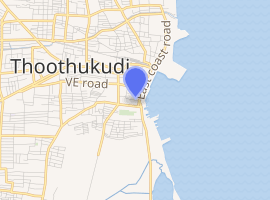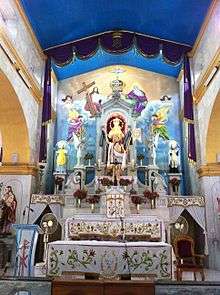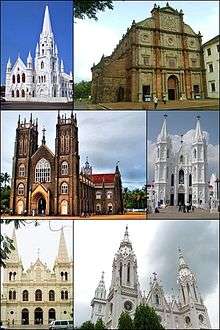Basilica of Our Lady of Snows, Thoothukudi
Our Lady of Snows Shrine Basilica is located at Thoothukudi, Tamil Nadu, India. It is one of the Catholic pilgrimage centers in India dedicated to the Our Lady of Snows, a title given to St. Mary. The Shrine name refers to the Basilica di Santa Maria Maggiore in Rome.
| Our Lady of Snows Shrine Basilica | |
|---|---|

| |
| 8.799444°N 78.156389°E | |
| Location | Thoothukudi, Tamil Nadu |
| Country | India |
| Denomination | Catholic |
| Website | www.snowsbasilica.com |
| History | |
| Status | Basilica |
| Founded | 16th century |
| Dedication | St. Mary |
| Architecture | |
| Functional status | Active |
| Style | Portuguese |
| Administration | |
| Diocese | Tuticorin |
| District | Tuticorin |
| Clergy | |
| Bishop(s) | Most. Rev. Dr.Stephen Anthony. |
| Rector | Rev. Dr. Kumar Raja |
| Assistant priest(s) | Rev. Fr. Kingston |
History
Paravars of the Pearl Fishery Coast

The history of Shrine Basilica is closely connected with the history of the conversion of the Paravars (Tuticorin), the indigenous people of the Pearl Fishery Coast. In fact, Our Lady of Snows, was fondly called in Portuguese Nossa Senhora das Neves which means Our Lady of Snows. She has been given the unique title of Yelu Kadalthurai, Yega Adikala Thai in Tamil which means the Mother of Refuge for the seven major coastal villages, viz Vembar, Vaippar, Thoothukudi (Snows Basilica, Tuticorin), Punnaikayal, Virapandianpatinam, Alanthalai and Manapad (Thoothukkudi District).
Mass conversion
Once the paravars of Pearl Fishery Coast had a sharp dispute with the Muslims of this area regarding the right of Pearl Fishing. The Pattankattimar (The leaders of Parava villages) requested the Portuguese to rescue them from the cruelties of the Muslims and the Portuguese agreed on condition of converting to Christianity and the Portuguese routed the Muslims. As a token of gratitude to their redeemers, the Portuguese, the Paravars from about 22 villages numbering about 30,000 embraced Christianity in the year 1535–37. In October 1542, St. Francis Xavier arrived on the shores of the Pearl Fishery Coast to catechize them and strengthen them further in their faith.
Persecution
Soon there arose a great religious persecution by the Nayak of Madurai who had by this time taken control of the Pearl Fishery Coast. They set fire to churches and houses of Catholics. Hence the Paravars left Thoothukudi ( Tuticorin ) and fled to a nearby Island named Raja Theevu (known as Hare-island today). They took along with them the statue of Our Lady of Snows and solemnly installed it in a newly built church there. It was there till the Jesuits returned to Thoothukudi ( Tuticorin ) in 1610.
Another tradition says that during the war, the church of Our Lady of Snows at Raja Theevu was destroyed and therefore, the people removed the statue from there and installed it in a small chapel of St. John the Baptist at Sivanthakulam near Thoothukudi ( Tuticorin ). When the Dutch occupied that area, they carried away the statue to a church at Korkai. And it was brought back to Thoothukudi ( Tuticorin ) in 1699.
Statue
The beautiful statue of Our Lady of Snows has always been looked upon as a miraculous one, as many miracles are said to have occurred in the Shrine from the time of its installation at St. Paul's Church, Tuticorin.
Saved from a thunderbolt
The first miracle is narrated by Rev. Fr. Vigilius Mansi himself who built the present Church of Our Lady of Snows. In a letter dated 24 September 1708 addressed to one Father Maria Ignacy in Rome, he narrates how on 4 April 1707 at mid-night, a sonorous and fierce thunderbolt fell in his residence where he had kept the miraculous statue for a short time and how he was miraculously saved by Our Lady herself.
Other miracles
The Jesuit report of 1709 by Fr. Francis Vaiz mentions the following miracles.
A newly converted Dutch Officer was attacked by a serious disease. No doctor nor medicine could cure him. The condition became worse day by day. On his death bed, he had recourse to Our Lady drank the water that washed the feet of the miraculous statue of Our Lady of Snows. What a surprise! He began to get well from that moment and he totally embraced the Catholic faith latter.
Two people who were paralyzed and lost all hope of cure, vowed in front of the miraculous statue that they would pray the Rosary daily till the end of their lives and drank with faith the water that washed the feet of the statue. Slowly they were relieved of their paralysis and soon got completely healed.
A supposed to be barren woman with faith drank the oil form the lamp kept near the miraculous statue and was conceived and became a mother of a child.
Once a pious woman had gone to the Shrine to participate in the Novena Service. At that time her hut caught fire by a piece of cloth that fell on the oil lamp. The whole hut should have been burnt to ashes but surprisingly, only that piece of cloth had got burnt!
Even the Hindus who come flocking to Our Lady of Snows acknowledged that they had experienced miracles after praying to Our Lady. Even today we find Hindus and people of other faiths flocking to Our Lady of Snows Church especially during the annual festival days. There are a few sincere devotees who visit the shrine throughout the year.
The holy custom of drinking the water that washes the feet of Our Lady in the statue and using the oil from the lamp are still followed by some devoted people.
History of Snows Basilica
As the whole race of Paravars became Christians, they were badly in need of a place of worship. Fr. Pedro Gonsalves who had baptised the people, built the first church in Thoothukudi ( Tuticorin ) in 1538 and dedicated it to his own patron St. Peter; this was the Parish Church for the Parava Christians in Thoothukudi ( Tuticorin ) for many years. It is also said St. Francis Xavier, during his stay at Thoothukudi ( Tuticorin ), used to celebrate the whole Mass in this Church. Today, a street named, St. Peter Koil Street, tuticorin exists in the Parish area ( Tuticorin ).
Church dedicated to Our Lady
Then in 1582, through the efforts of the Jesuits, a church dedicated to Our Lady of Mercy (Nossa Senhora da Piedade) was consecrated by the Bishop of Cochin Msgr. De Evora on 5 August, the feast of Our Lady of Snows. It was in the Jesuit headquarters in Keracope Street. It was also called St. Pauls Church, Tuticorin. Every year the annual feast was celebrated on 5 August. In 1610 when the miraculous statue of Our Lady of Snows reached Thoothukudi ( Tuticorin ), it was solemnly installed in the church of Mother of Mercy and thereafter gradually it came to be called the Church of Our Lady of Snows Basilica.
New church history
Wishing to build a beautiful church of Our Lady of Snows Basilica, Fr. Vigilius Mansi whole heartedly took great efforts. He had to face lot of difficulties from the side of the Dutch as well as that of his own people. He obtained permission from the Dutch Government (at Ceylon) to construct a new church for Mother Mary of Snows, tuticorin; swimming against the current, he laid the foundation for the new church on 4 April 1712 and within a year he was able to complete the church. On 5 August 1713, the new church was opened and blessed and the first feast in the new church was celebrated in a very grand scale.
Problem of double jurisdiction
From 1857 onwards, the so-called Double Jurisdiction caused a great problem among the Parava-Christians of Pearl Fishery Coast. In the same diocese and sometimes within the same parish at one and the sametime the Portuguese government (Padroado Goa Mission) and the Propaganda Fide (French Mission) had their jurisdiction. Accordingly, the following five coastal parishes came under the Padroado Diocese of Mylapore : Our Lady of Snows Basilica, Thoothukudi, Holy Ghost Manapad, St. Michaels Punnaikayal, Our Lady of Assumption Vaippar and St.Marys Kooduthaai. This condition continued till the new diocese of Thoothukkudi ( Tuticorin ) was erected in 1923. Pope Pius XI through the Apostolic Brief Quae Catholico Nomini dated 12 June 1923 amalgamated the above parishes into the newly created Diocese of Thoothukudi ( Tuticorin ). Accordingly, the Church of Our Lady of Snows came under the jurisdiction of the Bishop of Thoothukudi ( Tuticorin )on 11 April 1930.
Raised to the status of Basilica
In 1982, when the Church of Our Lady of Snows celebrated the 400th anniversary, Pope John Paul II raised it to the status of Basilica through his apostolic letter Pervenute illa Dei Beatissimae Genitricis Effigies dated 30 July 1982.
It is the greatest honour for a church to be raised to the status of a Basilica. The Greek word Basilica signifies a Royal Hall. In course of time, this word has come to mean a large and beautiful hall. In ancient times, the whole world in general and Rome in particular, erected large halls for administrative purposes. The first hall bearing the name of Basilica existed in Athens. But after the fall of Greeks, the Romans popularised it. It was Julius Caesar who artistically constructed the hall of Basilica Julia for administrative purposes. They are somewhat similar to the Durbar Halls in ancient Indian places.
Christ being the king and His Church being His Audience the larger Christian Churches in Rome, came to be called Basilicas. Naturally these Basilicas were large, roomy, bright and ornamental. Today, for a church to be raised to the status of Basilica certain conditions are to be fulfilled:
The Church, usually is built with the altar facing the east. Generally it is constructed in one of the classical styles of architecture. It should contain some works of art or house the body of a Saint or a celebrated statue venerated in the land or it should be a place of pilgrimage.
Our shrine of a true basilica
The Shrine Basilica of Our Lady of Snows is fascine East; constructed in the Portuguese architecture; it houses the celebrated and miraculous statue of Our Lady of Snows, most beautifully carved out of wood and hence it is a great piece of art. Thus the Shrine Basilica of Our Lady of Snows deserves to be called a Basilica in the true sense of the word!
In Rome itself there are 13 Basilicas and of which 5 are major and 8 are minor ones.
Basilicas are usually under the supervision of Cardinals and accorded special privileges. In India there are several minor basilicas, like Basilica of Our Lady of Mount Bandra in Mumbai, the Basilica of Born Jesus in Goa, the Basilica of San Thome in Chennai, the Basilica of Our Lady of Health at Velankanni, the Basilica of Our Lady of Presentation, Bengaluru and the Basilica of Our Lady of Lourdes, Poondi.
Notable Parish Priests
Servant of God Rev Fr. Antony Soosainather
See also
Other Catholic pilgrimage centres
- Basilica of Our Lady of Snow, Pallippuram, Ernakulam, Kerala, India.
- Basilica of Our Lady of Good Health, Velankanni, Tamil Nadu, India.
- Holy Cross Church, Manapad, Tamil Nadu, India.
- Poondi Matha Basilica (Our Lady of Lourdes Basilica, Poondi), Tamil Nadu, India.
- Kamanayakkanpatti Church of Our Lady of Assumption (பரலோக மாதா திருத்தலம்)
- Our Lady of Snow Kallikulam (Our Lady of Snow Church, Kallikulam), Tamil Nadu, India.
- St. Stephen's Church, Kombuthurai
- Our Lady of Snows, Maravankudieruppu, Nagercoil
- Our Lady of Snows, South Thamaraikulam, Nagercoil
References
External links
| Wikimedia Commons has media related to Basilica of Our Lady of Snows, Thoothukudi. |
